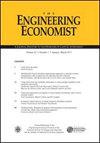从社会规划者的角度评估输电扩展规划的灵活性:一种方法及其在智利电力系统中的应用
IF 1.2
4区 经济学
Q4 BUSINESS
引用次数: 2
摘要
摘要本文从社会规划者的角度,利用实物期权研究了输电网扩容规划(TEP)项目增加灵活性的价值。由于电力市场的放松管制,TEP项目目前面临诸多不确定因素。这些不确定性经常导致传统的项目评估方法推荐次优投资决策。此外,为了纳入不确定性对TEP项目估值的影响,目前的文献依赖于一些关键的简化,这些简化并不适合电力市场的实际运行。本文将均衡模型与基于实物期权的估值模型相结合,以现实的方式对电力市场进行建模,以评估TEP项目将产生的电力市场均衡,并纳入灵活性的价值。该方法用于确定自2018年以来连接智利两个主要互联系统的刚性TEP项目的一部分增加容量扩展灵活性的价值。我们的结果表明,在这种情况下,增加灵活性将使净预期社会福利增加1403万美元。一些敏感性分析证实,当不确定性较高和/或投资成本较低时,这种灵活性具有更大的价值。本文章由计算机程序翻译,如有差异,请以英文原文为准。
Valuing flexibility in transmission expansion planning from the perspective of a social planner: A methodology and an application to the Chilean power system
Abstract We study the value of adding flexibility to Transmission Expansion Planning (TEP) projects from the perspective of a social planner using real options. Due to the deregulation of electricity markets, TEP projects currently face multiple uncertainties. These uncertainties often cause traditional project valuation methods to recommend sub-optimal investment decisions. Additionally, to incorporate the effects of uncertainties on the valuation of TEP projects, current literature rely on some critical simplifications that do not fit well with the real operations of a power market. This paper models the power market in a realistic way by combining an equilibrium model, to assess the power market equilibrium that the TEP project will generate, with a valuation model based on real options, to incorporate the value of flexibility. The methodology is applied to determine the value of adding capacity expansion flexibility to a portion of the rigid TEP project that connects the main two interconnected systems in Chile since 2018. Our results show that, in this case, adding flexibility increases the net expected social welfare by $14.03 million. Several sensitivity analyses confirm that this flexibility has more value when uncertainty is higher and/or investment costs are lower.
求助全文
通过发布文献求助,成功后即可免费获取论文全文。
去求助
来源期刊

Engineering Economist
ENGINEERING, INDUSTRIAL-OPERATIONS RESEARCH & MANAGEMENT SCIENCE
CiteScore
2.00
自引率
0.00%
发文量
14
审稿时长
>12 weeks
期刊介绍:
The Engineering Economist is a refereed journal published jointly by the Engineering Economy Division of the American Society of Engineering Education (ASEE) and the Institute of Industrial and Systems Engineers (IISE). The journal publishes articles, case studies, surveys, and book and software reviews that represent original research, current practice, and teaching involving problems of capital investment.
The journal seeks submissions in a number of areas, including, but not limited to: capital investment analysis, financial risk management, cost estimation and accounting, cost of capital, design economics, economic decision analysis, engineering economy education, research and development, and the analysis of public policy when it is relevant to the economic investment decisions made by engineers and technology managers.
 求助内容:
求助内容: 应助结果提醒方式:
应助结果提醒方式:


